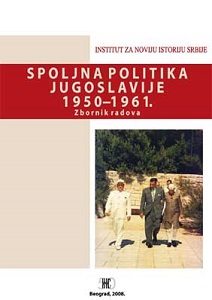Drugi jugoslovensko-sovjetski sukob
The Second Yugoslav-Soviet Conflict
The Clash between Tito’s and Khrushchev’s Perception of the Peaceful Coexistence Policy
Author(s): Dragan Bogetić
Subject(s): Diplomatic history, Political history, WW II and following years (1940 - 1949), Post-War period (1950 - 1989), History of Communism, Cold-War History
Published by: Institut za noviju istoriju Srbije
Keywords: The Second Yugoslav-Soviet Conflict; Josip Broz; Khruschev; Peaceful Coexistence Policy
Summary/Abstract: After ten years, the same issues, typical of the sharp confrontation between Yugoslavia and the USSR in 1948, characterized the second Yugoslav-Soviet conflict, as this sudden deterioration of relations between Belgrade and Moscow in 1958 was often termed in the West. However, this time the conflicts were less severe and less dangerous than the previous one, but their essence and issues were mainly the same.
The cause for renewed discontinuation of cooperation between the states and parties of Yugoslavia and the USSR was Yugoslavia’s rejection to sign the Declarations of 12 communist parties at the conference in Moscow held in November 1957, and the adoption of the Program of the League of the Communists of Yugoslavia (SKJ) at the Seventh Congress in Ljubljana in April 1958. However, the main reason of the confl ict between Khrushchev and Tito appeared due to the total failure of the Soviet action to get Yugoslavia back to the camp of socialist states and to persuade the Yugoslavs to renounce the politics of avoiding firm alliance with any of the two blocs. All the Khrushchev’s illusions of Yugoslavia’s return to the socialist circle definitely dispelled when the Yugoslav communists, instead of signing the Moscow declaration that had the character of the constitutive act of the new Cominform, adopted the Program of SKJ, i.e. a document of completely different content, with stress on communist parties’ independent choice of their path to socialism.
In the scope of a fierce campaign against the Yugoslav „revisionist leadership” Moscow undertook a series of foreign-policy measures in an effort to hamper Yugoslavia’s international activities and consolidation of its internal order as much as possible. During 1958 and 1959 previously concluded spectacular credit arrangements have been cancelled, the scope of commodity trade has been reduced, the practice of exchange of top-level state visits has been discontinued and permanent political pressure has been exerted, very much like the one practiced in Stalin’s time. Such policy was fully adopted by other socialist countries, even those which have formerly followed some elements of the Yugoslav politics in certain segments of political system.
Book: Spoljna politika Jugoslavije 1950-1961.
- Page Range: 49-65
- Page Count: 17
- Publication Year: 2008
- Language: Serbian
- Content File-PDF

